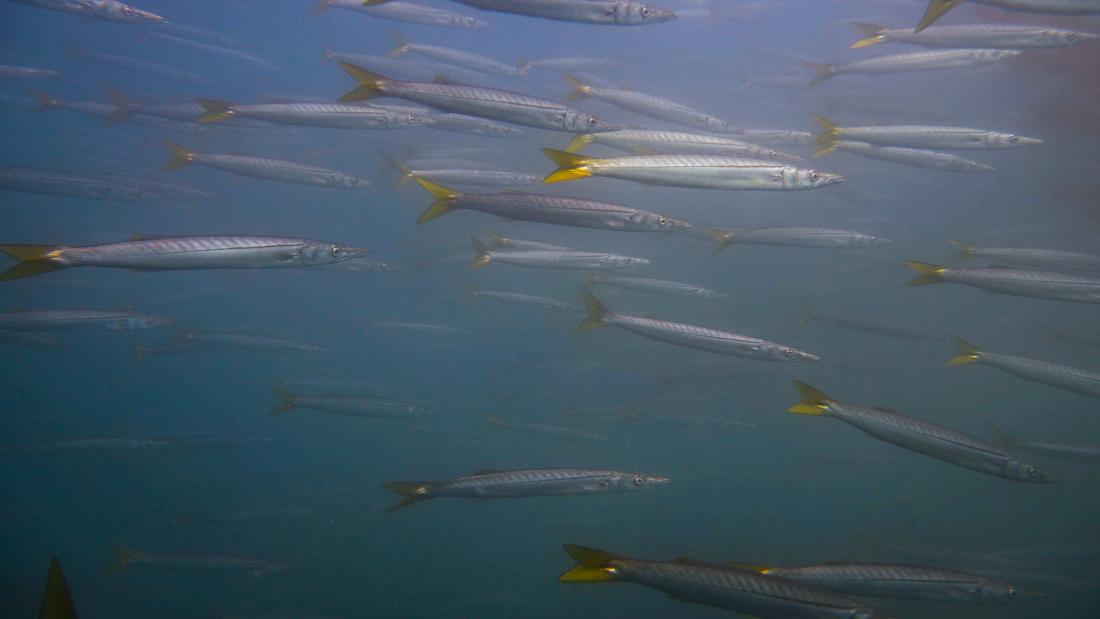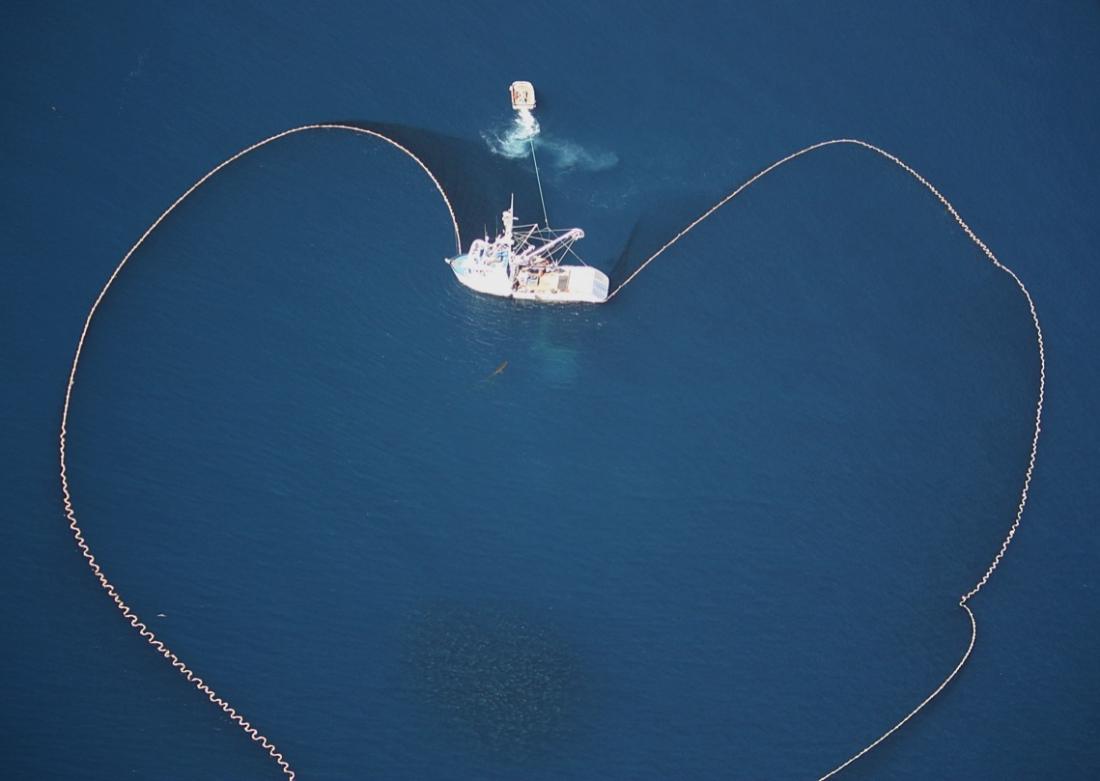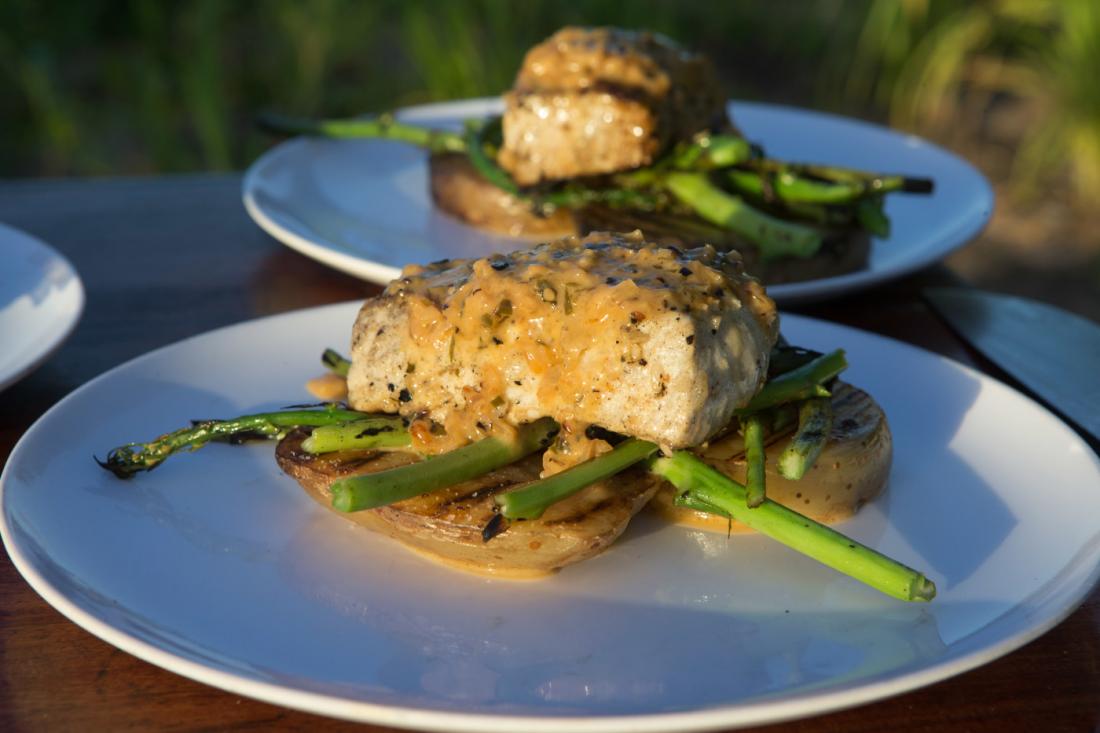California Barracuda
Sphyraena argentea
The Science
THE SCIENCE
All bark, no bite: although this fish looks intimidating, it is typically not aggressive and swims away when approached.

Taxonomic description
- Has a long, slender, almost round body. [1]
- Has a large mouth with canine-like teeth; the lower jaw projects beyond a sharply pointed snout; and it has two dorsal fins that are small and widely spaced. [1]
- Dorsal side is grayish-black with a bluish tinge and the ventral side and belly are silvery or white. Its tail is yellowish. Females have a charcoal black edge on the pelvic and anal fins; the same fins of males are edged in olive or yellow. [1]
- Can grow up to 1.2 m (4 ft) long and weigh up to 8 kg (18 lbs). [4]
Distribution
- Ranges from Kodiak Islands, Alaska to Cape San Lucas, Baja California, Mexico. [1]
Life history
- Lives up to 12 years, and begins maturing in its second year of life. [9]
- Egg production per spawning period increases from 50,000 eggs at age 2 to upwards of 400,000 eggs by age 6. [9]
- Can spawn more than once per spawning season. [9]
- Off southern California, external fertilization takes place from April to September, peaking in June. [6]
Habitat
- Prefers coastal areas near reefs or kelp, but has been found in waters as deep as 37 meters (120 ft). [1]
- Young (~15 cm length) are found in shallows in bays, marinas, and kelp forests. [4]
- Juveniles and adults form long, thin schools sometimes many miles long. [4]
- Primarily preys on anchovies and other small fishes such as sardines, young mackerel, and grunion; schools of barracuda known to herd prey into shallow water for easier capture. [4]
- Predators of California barracuda include birds like bald eagles and terns, and people. [1]
The Fishery
THE FISHERY
This fish is subject to a small commercial fishery, but is a popular target for sport fishermen.

Seasonal availability
- First sightings of schools occur in the middle of March, reaching a maximum between May and Late September/Early October.
Regulatory and managing authority
- There is currently no national management for the California barracuda, but it is mentioned by the Pacific Fishery Management Council's Fishery Management Plan for U.S. West Coast Fisheries for Highly Migratory Species. [7]
- As established by the Marine Life Management Act, the California Fish and Game Commission (CFGC) regulates the fishery in state waters, and the California Department of Fish and Wildlife (CDFW) collects data and helps enforce FMP management rules for this fishery. [6,7]
Gear type
- Three types of commercial gear used are: circle nets (purse seines), gill nets, trolling, hook and line. [1,9]
Status of the fishery
- The minimum size legally permitted to be taken is 28 in. [6]
- In 1929, law was passed in regards to regulating purse seine and round haul net use between August 1 and April 30, when major spawning events take place.
- Use of netting during these major spawning months is prohibited. [9]
- Populations of this fish decreased from the 1900s through the 1940s due to a rise in purse seine fishing, however populations have since recovered and are considered stable due to catch limits (size and number), replacement of purse seines with gill nets, substantial egg production, and decreased consumer demand for this species. [1,4]
Potential ecosystem impacts
- Gillnets have highest bycatch rates of marine mammals, sea turtles, sea birds, and sharks of any fishing gear. [9]
The Seafood
THE SEAFOOD
Barracuda offers the same protein content as salmon (38-39 g), but has almost 9 grams less of fat per serving.


Edible portions
- Meat with skin on or off. [11]
- The Kama (collar) part is also a rich piece of meat that can be saved. [11]
- Female Roe from early in the season is edible as well. [11]
Description of meat
- Full flavor, meaty firm texture with large flakes, low fat content and off-white color when cooked. [2]
Culinary uses
- Can be eaten as fillets, steaks, or whole dressed (gilled and gutted). [2,11]
- Common uses- broiled, baked, poached, smoked, sautéed, or grilled. [2]
- Deep frying is not recommended, as this fish has a high oil content. [11]
- For a smokey barracuda recipe, visit Kiran Jethwa. [13]
- For a barracuda fish taco recipe, visit SoCal Salty. [14]
Nutrition Information
- Nutrition information shown in table. [10]
Toxicity report
- Although larger barracuda species (especially in the Atlantic) are associated with ciguatera poisoning, this species does not show signs of such toxicity. [2]
Seasonal availability
- Available fresh between April to Mid-September; Frozen available all year long. [2]
References
[1] Aquarium of the Pacific. California Barracuda. http://www.aquariumofpacific.org/onlinelearningcenter/species/california_barracuda. 2017. Accessed: 17 May 2017.
[2] Chefs Resources. Barracuda Fish.http://www.chefs-resources.com/seafood/finfish/barracuda-fish/#ixzz4eHTkXi3g. 2017. Accessed: 22 May 2017.
[3] Brown, S., P. Auster., L. Lauck. 1998. National Oceanic and Atmospheric Administration (NOAA). Ecological Effects of Fishing. 1-62.
[4] Monterey Bay Aquarium Foundation. California Barracuda. http://www.montereybayaquarium.org/animal-guide/fishes/california-barracuda. 2017. Accessed 21 May 2017.
[5] California barracuda. Monterey Bay Aquarium. n.d. Web. https://www.montereybayaquarium.org/animals/animals-a-to-z/california-b…. Accessed 26 August 2020.
[6] California Department of Fish and Wildlife. 2019. Pacific Barracuda, Sphyraena argentea, Enhanced Status Report. Web. https://marinespecies.wildlife.ca.gov/pacific-barracuda/. Accessed 26 August 2020.
[7] Fishery Management Plan for U.S. West Coast Fisheries for Highly Migratory Species. 2018. Pacific Fishery Management Council. Web. https://www.pcouncil.org/documents/2018/04/fishery-management-plan-for-…. Accessed 24 August 2020.
[8] Robertson, R., Collette, B., Molina, H., Guzman-Mora, A.G. & Salas, E. 2010. Sphyraena argentea. The IUCN Red List of Threatened Species 2010: e.T178105A7488494. http://dx.doi.org/10.2305/IUCN.UK.2010-3.RLTS.T178105A7488494.en.
[9] Shultze, D. L. California Barracuda Life History, Fisheries and Management. Vol. XXIV. 1983. 1-9.
[10] Barracuda. Myfitnesspal.com. n.d. Web. https://www.myfitnesspal.com/food/calories/barracuda-fish-594210366. Ac… September 2017.
[11] Spira, J. n.d. Southern California Ocean Fishing. All About Barracuda. Web. http://socaloceanfishing.com/hf_barr.html. Accessed 21 Sept 2020.
[12] uzun. iNaturalist. 2018. Digital image. Web. https://www.inaturalist.org/photos/17873005. Accessed 12 February 2021.
[13] Baker, Darren. Photo of barracuda taken from Point Loma, USA. n.d. Digital image. Fishbase. Web. https://www.fishbase.se/photos/UploadedBy.php?autoctr=16282&win=uploaded. Accessed 26 August 2020.
[13] Jethwa, Kiran. Photo of barracuda dish. 2015. Digital image. Web. http://www.kiranjethwa.net/recipes/smokey-barracuda-with-seared-potatoe…. Accessed 26 August 2020.
[14] SoCal Salty. 2011. Barracuda Fish Tacos. Web. https://socalsalty.wordpress.com/2011/06/18/barracuda-fish-tacos/. Accessed 12 February 2021.



